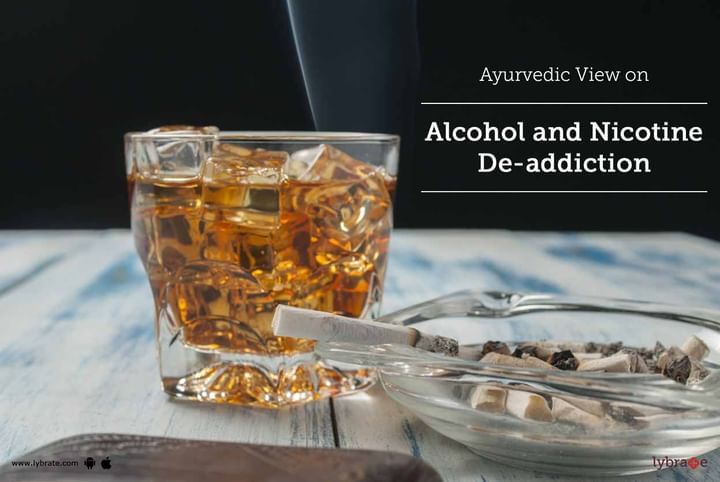Ayurvedic View on Alcohol and Nicotine De-addiction
What happens when you are addicted to a chemical substance? You lose control of your life. It doesn’t matter what you are addicted to alcohol, nicotine or drugs the effects are the same. It is usually not easy to get rid of an alcohol and/or nicotine addiction. Most people find it difficult to give up these substances even after years in de-addiction therapy. Hence, it’s prudent to let Ayurveda, the ancient science of healing handhold us in getting rid of addictions.
Cigarette smoke contains over 4,000 chemicals, including 43 known cancer-causing (carcinogenic) compounds and 400 other toxins. These cigarette ingredients include nicotine, tar, and carbon monoxide, as well as formaldehyde, ammonia, hydrogen cyanide, arsenic, and DDT. Perhaps this list of ingredients that are found in cigarettes is enough to make you want to quit smoking for good! - Lowell Kleinman, M.D., and Deborah Messina-Kleinman, M.P.H
Addiction - The Ayurvedic View
Ayurveda considers alcohol and nicotine consumed in large quantities as ‘Visha’ or toxic. According to Ayurveda, alcohol has the following properties-
- Light or Laghu
- Hot or Ushna
- Sharp or Tikshna
- Drying or Visada
- Rough or Ruksha
- Expensive or Vikaasa
- Swift or Aasuga
- Sour or Amla
- Subtle or Sookshma
These properties are all opposite to the qualities that ojas possesses. Ojas has all life-giving properties and alcohol and nicotine have life-negating qualities.
Why do humans get addicted to alcohol and nicotine?
Human brain produces Dopamine normally and what alcohol does is to activate the nervous system to promote dopamine formation. The brain thus remembers the taste of alcohol and nicotine by creating special cells called receptor cells. As a person increases the quantity of alcohol, these cells also increase in numbers. When the person wants to give up his addictions these receptor cells agitate and create withdrawal symptoms with unpleasant and even dangerous symptoms.
De-addiction - Ayurveda Way
De-addiction treatments in Ayurveda comprise the following:
- Purification therapies or Panchkarma: These are used for getting rid of all toxins present in the patient’s body. These must always be done under the supervision of an ayurvedacharya as they are quite potent. After Panchakarma, the patient is given vomiting therapy or Vamana, followed by purgative therapy or Virechana, Basti or enema therapy and administration of Nasya or nasal drops therapy. All these help in detoxifying the body and mind and prepare the patient for further de-addiction ayurvedic treatments like Rasayana therapies which nourish and strengthen the body after Panchkarma. For treatment of addictions, Rasayana treatments include changes in diet and use of oral herbal medicines both.
- Herbal medicines used in de-addiction: A range of herbal medicines and their combinations are used in the treatment of addictive problems in Ayurveda and these are to be consumed orally. Ayurveda prescribes Chamomile and Ashwagandha in combination to heal the lungs. These help in cleansing lungs of smoke- related problems. Doctors also prescribe congestion relieving herbs like ginger and pepper mixed with honey or lemon.
In addition, herbs to improve memory, concentration and to fight depression are also given. These are:
- Shankhpushpi
- Kanphool or dandelion
- Brahmi
- Ashwagandha
In addition, herbs to treat sleep disturbances like Jatamansi, Sarpgandha, Brahmi and Jaiphal are also prescribed. Since most addicts have impaired liver function, herbs that improve liver function like Aloe Vera, Punarnava, Long pepper, Kutki, Tulsi are given to revive the liver. If you wish to discuss about any specific problem, you can consult an ayurveda.



+1.svg)
